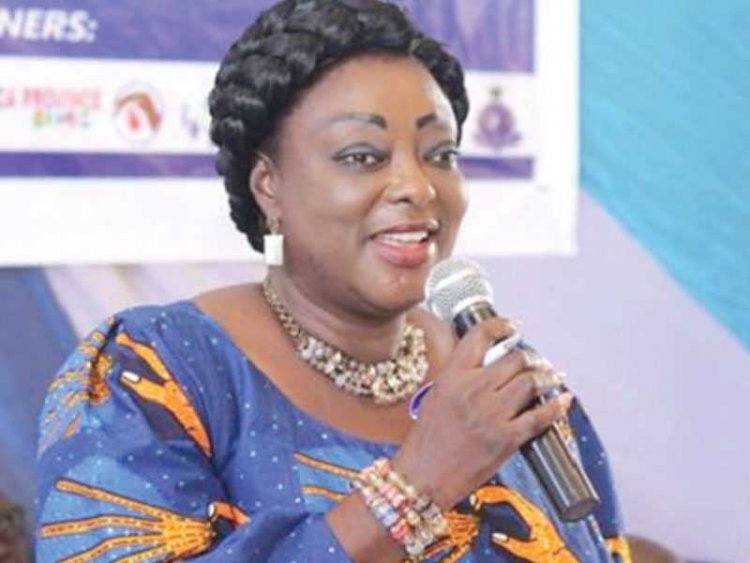THE MINISTER FOR Sanitation and Water Resources, Dr Freda Prempeh, has stressed the need for the various households in Ghana to be endeavoured to build their own toilet facilities which would help the people living in their house facilities to stop open defecation.
Dr Prempeh who doubles as the Member of Parliament (MP) for Tano North Constituency in the Ahafo Region charged the various management and leadership in Metropolitan, Municipal and District Assemblies (MMDAs) to continue to enforce their bye-laws in construction of toilets in both public and private buildings in the country.
According to him, toilets are intricately linked to public health, environmental sustainability, tourism, education, and economic development, stressing that access to clean toilets is a fundamental human right that many in our communities are still deprived of.
She indicated that in Ghana, like in many parts of the world, this lack of access poses severe challenges, impacting negatively on the health and dignity of our people.
She maintained that the importance of toilets cannot be overstated at all, adding that the focus here is not just about building toilets but it is also about building communities that thrive.
According to the Minister, clean toilets reduce the prevalence of waterborne diseases, enhance the quality of life, and empower individuals, especially women and children, who are disproportionately affected by inadequate toilets in our communities, schools, commercial areas and even at hospitals.
"I am calling on the management of basic schools and healthcare facilities to ensure that toilets are provided in them and well maintained and make accessible to all the pupils, students, parents, teachers and visitors," Dr Prempeh gave this forgoing advise to the households in a speech at a press launch of the commemoration of the 2013 World Toilet Day.
In Ghana, this year’s commemoration of the event which thewas held in Mpoase community park in the Ablekuma West municipality of the Greater Accra Region was under the theme “Accelerating Change through Strategic Partnership: Every Contribution Counts.”
This theme was chosen to highlight the critical roles partnership plays in the government's efforts in increasing access to toilet facilities in the country.
The WTD is an official United Nations (UN) international observance day on November 19 to inspire action to tackle the global sanitation crisis.
It addresses the need to have proper access to toilets and the significance of having good hygiene in our daily lifestyles.
It is a platform to raise awareness, inspire advocacy, create conversations related to good sanitation and how we all can do our bit in improving the scenario and demand action from our leadership at all levels.
There are 3.5 billion people still living without safely managed sanitation while about 419 million people still go to the toilet in the open according to the UN.
According to the Ghana Statistical Service, households practicing open defecation in Ghana stands at 17.7 per cent and those who have exclusive access to toilets are only 25.3 per cent.
Activities planned to commemorate the day include Mini Community Durbar at Mpoase Community Park, media discussions, sensitisation activities, Commemoration by WASH stakeholders and partners across the country, statement on the floor of parliament and the reading of sanitation messages/ sermons in churches and mosques among others.
Part of this year's theme suggest that "Every Contribution Counts," knowing that no effort is too small, and every action, no matter how modest, contributes to the larger goal of improving the over all sanitation situation of the country.
She stressed that whether it is individuals advocating for better facilities in their communities, government initiatives to implement robust policies and investing in infrastructure, NGOs working on the ground to bring about change, or businesses investing in socially responsible projects – every contribution is a step towards a healthier, more sustainable future for our people.
The minister stated that the government through the Ministry of Sanitation and Water Resources had invested heavily in several projects that would help eradicate open defection and enhance safe sanitation practices.
“For example, At the end of the GAMA Project in December, 2020, the Project had delivered 48,641 improved household toilets, benefiting about 389,128 people and 406 improved and modern disability-friendly, gender sensitive institutional toilet facilities benefiting about 251,872 pupils,” she cited.
The project, she indicated, will also expand and rehabilitate the Asafo Sewerage System in Kumasi and provide an additional 42,000 household toilets and 129 institutional toilets in the Greater Accra and Greater Kumasi metropolitan areas respectively.
She indicated that the various interventions initiated by the government had led Ghana to make significant strides towards the attainment of the Sustainable Development Goals on Water and Sanitation.
She explained that the population with access to improved toilet facilities, including shared toilets has also increased from 66 per cent to 80.8 per cent within the same period while the population with access to basic drinking water services has increased from 79 per cent in 2017/2018 to 87.7 per cent in 2021.
“Under the Greater Accra Sustainable Sanitation and Livelihoods Improvement Project (GASSLIP), 5000 Household toilets have been provided in the Greater Accra Region as well as 60 Institutional Toilet Facilities,” she said.
The Minister of Sanitation and Water Resources urged all Metropolitan, Municipal and District Assemblies (MMDA’s) to enforce their bye-laws on construction of toilets in private and public buildings and encouraged management of basic schools and health care facilities to follow suit.
“The Ministry therefore, wishes to appeal to our media fraternity, religious and traditional leaders to use their influence in society to sensitise their audience, followers, congregation and subjects respectively to stop open defecation and build their own toilets,”she added.




 Freeman Koryekpor
Freeman Koryekpor 



































